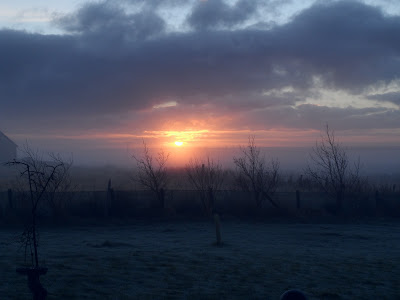Morning Ragas One and Two
A raga is a particular form of Hindustani classical music. For those with ears more musical than mine, there is much to explore within the tradition and the complexity. Unlike most western music, there is a specific association in many cases with time of day and even season. As the sun was lighting up the sky this morning, I remembered a concert of ragas in a church hall in a suburb of Indianapolis many years ago. It is music to get lost in and find yourself again. It is, like jazz, played by musicians who know their instruments and the traditions of the music well, but play within that framework--riffing off each other, if I can extend my mini-musical knowledge with another cross-cultural metaphor. I remembered watching the music unfold and the feelings it created within me.
I miss the music and music making and the friends who dubbed me 'Ganesh-an' after the elephant-headed God, Ganesh. Ganesh is known, among other things, as the remover of obstacles and seems to be associated with travelling and good beginnings. In the early morning on the far north coast of Scotland, those motifs began running in my head.
Ganesh is often pictured dancing. I have several images gifted to me by my friends. In the one on my mantel, Ganesh has bells on his ankles and is dancing. If you look at it for more than a moment, you can hear the bells. In another miniature, a tiny Ganesh stands still with a parasol over his head. Perhaps it's meant to indicate a traveller, but to me it looks like the doo dah man of New Orleans jazz.
And so what else could I do but make my own morning ragas?
Early Morning Raga I
Perhaps the sun arrives today with news
to lift my heavy tread. When did my feet
become so earthbound stiff and slow?
If I could fly what would I see instead
of walls and floors and all the chores to do
for those of us born out of clay and sea?
After Coffee Morning Raga II
Begin with mismatched socks
stripes on one foot dots on the other
or stars or sheep whatever once
made you smile
Put on that smouldering red shirt today
What have you been saving it for?
We’ve already had the rainy days
More than Noah and his overcrowded ark endured
Before the flood washed the world clean again
Come out among the flotsam and the jetsam
fabric torn and left flapping in the breeze
prayer flags for wayfarers in our strange new old world.


